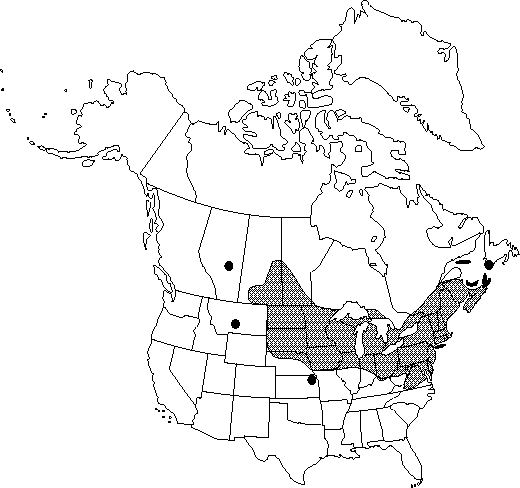Humulus lupulus var. lupuloides
Syst. Bot. 3: 63. 1978 Humulus americanus Nuttall.
Stems relatively pubescent at nodes, usually more than 15 hairs per 0.1 sq. mm at most pubescent portion (excluding angle of petiole with stem). Leaf blades 10 cm or more usually having fewer than 5 lobes; smaller blades (ca. 5 cm) often with no more than 3 easily visible veins branching off midrib (excluding proximal branches); surfaces abaxially not conspicuously pubescent, usually fewer than 100 hairs per cm on length of medial midrib, more than 25 glands per 10 sq. mm between veins, hairs usually absent between veins.
Habitat: Moist thickets, woods, riverbanks
Elevation: 0-2000 m
Distribution

Alta., Man., N.B., Nfld. and Labr. (Nfld.), N.S., Ont., P.E.I., Que., Sask., Conn., Del., Ill., Ind., Iowa, Kans., Ky., Maine, Md., Mass., Mich., Minn., Mont., Nebr., N.H., N.J., N.Y., N.Dak., Ohio, Pa., R.I., S.Dak., Vt., Va., W.Va., Wis.
Discussion
Humulus lupulus var. lupuloides, defined as an intermediate, encompasses plants not falling into the other three varieties occurring in North America that are much more distinctive. It intergrades where it is sympatric with the introduced H. lupulus var. lupulus in southern Ontario, southern Quebec, and northeastern United States; with H. lupulus var. pubescens in midwestern United States; and with H. lupulus var. neomexicanus in the southern Canadian prairies and the Dakotas.
Selected References
None.